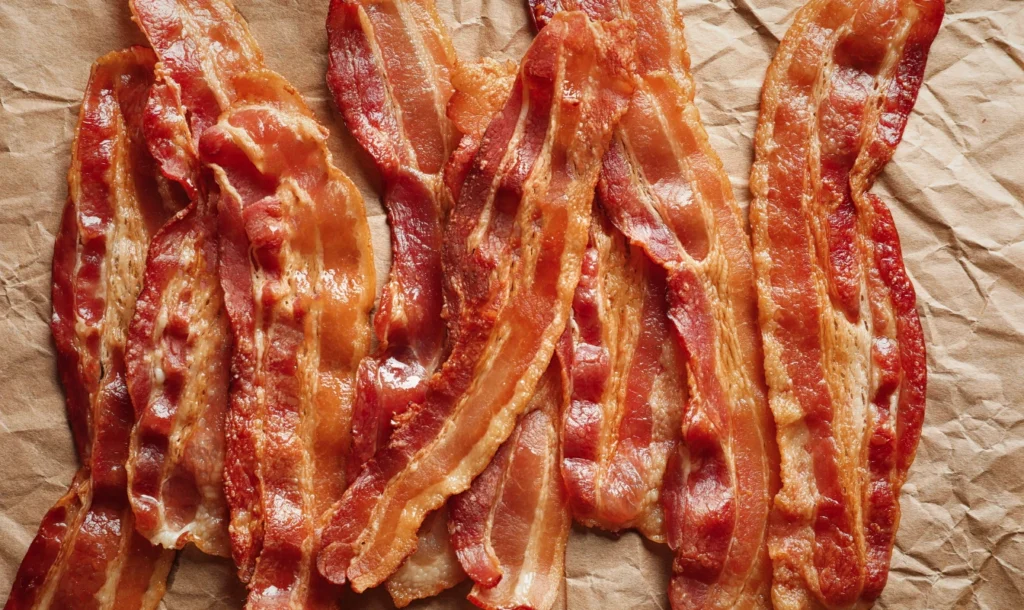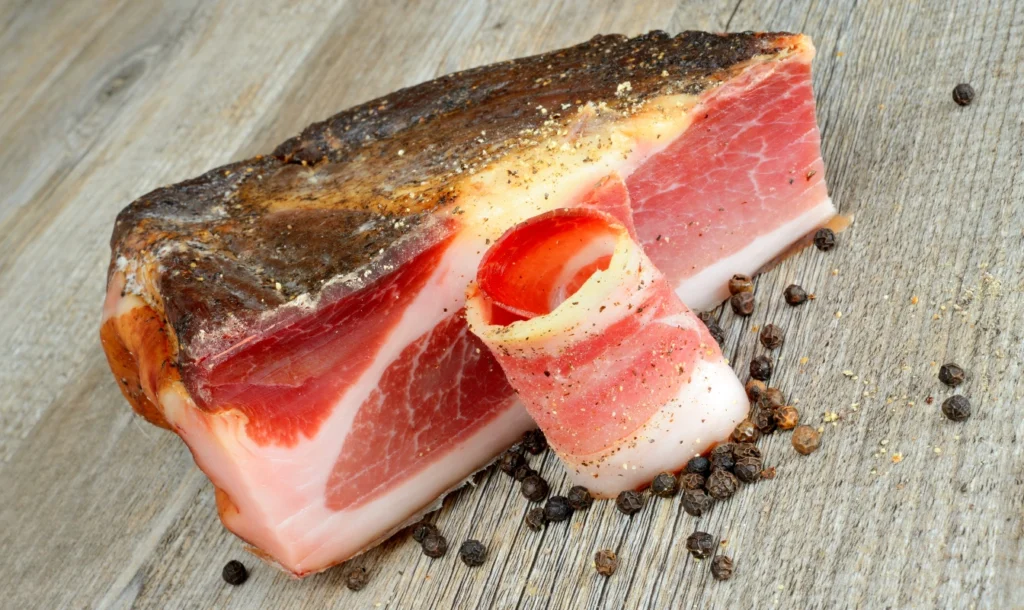Health Benefits of Beef Bacon
Overview of Beef Bacon
Beef bacon has been gaining popularity as an alternative to traditional pork bacon, especially among those who follow specific dietary preferences or have restrictions due to religious beliefs. Made from the belly or brisket of cattle, it offers a unique flavor profile that sets it apart from its pork counterpart. When one thinks of bacon, the image of crispy strips sizzling in a pan often comes to mind. However, beef bacon presents a different experience, with its richer taste and firmer texture.One of the benefits of beef bacon is its ability to add variety to meals while catering to those who prefer not to consume pork. Additionally, it provides a unique flavor that complements a range of dishes. This twist on a classic favorite not only enhances traditional meals but can also be a nutritious choice for individuals seeking a higher protein option. Another appealing aspect of beef bacon is its versatility; it can be added to breakfast dishes, salads, or even served as a delightful topping on burgers.
For instance, imagine taking a classic cheeseburger and topping it with a few slices of beef bacon instead of the usual pork. The result? A burst of flavor that elevates the entire dish. With its distinct taste and adaptability, beef bacon is a fantastic choice for those exploring flavorful and versatile alternatives to pork bacon.
Nutritional Comparison with Pork Bacon
When considering the health benefits of beef bacon, a key factor is comparing its nutritional content with that of pork bacon. While both types of bacon are known for their high-fat content, they have unique nutritional profiles worth examining.
| Nutritional Component | Beef Bacon (per 100g) | Pork Bacon (per 100g) |
|---|---|---|
| Calories | 400 | 500 |
| Total Fat | 37 g | 42 g |
| Saturated Fat | 13 g | 14 g |
| Protein | 25 g | 24 g |
| Cholesterol | 100 mg | 110 mg |
| Sodium | 1,100 mg | 1,400 mg |
From the table, it’s evident that beef bacon generally has fewer calories and slightly less fat compared to pork bacon. This may make it a preferable choice for individuals looking to manage their caloric intake without sacrificing flavor. Moreover, the protein content is surprisingly comparable, making beef bacon a solid option for those wanting to increase their protein consumption. Additionally, beef bacon tends to have a higher iron content, which is vital for maintaining energy levels and overall health. Many people, especially those who might experience fatigue or low energy, find that incorporating iron-rich foods positively impacts their well-being. In conclusion, beef bacon isn’t just a substitute for those avoiding pork; it can be a delightful and nutritionally sound addition to a balanced diet. The next time you’re looking to spice up your meals with something nutritious and delicious, consider giving beef bacon a try.
Comparison of Nutritional Value
Macronutrient Content
To further appreciate the health benefits of beef bacon, it’s essential to examine its macronutrient content closely. When it comes to macronutrients, which include proteins, fats, and carbohydrates, beef bacon has some distinct advantages that make it appealing for those building a nutritious diet. Both beef and pork bacon are primarily composed of fats, but they contribute different profiles to your dietary intake. Here’s a breakdown of the key macronutrients found in beef bacon compared to pork bacon:
| Nutritional Component | Beef Bacon (per 100g) | Pork Bacon (per 100g) |
|---|---|---|
| Total Fat | 37 g | 42 g |
| Saturated Fat | 13 g | 14 g |
| Protein | 25 g | 24 g |
| Carbohydrates | 0 g | 0 g |
As showcased in the table, beef bacon contains slightly less total fat and saturated fat, which is a plus for those watching their fat intake. For anyone looking to boost their protein consumption, beef bacon also offers a slight edge with 25 grams of protein per 100 grams, compared to only 24 grams in pork bacon. This can be particularly beneficial for athletes or anyone engaged in regular physical activity, as increased protein intake helps with muscle recovery and growth. It’s worth noting that beef bacon is relatively low in carbohydrates, making it suitable for ketogenic or low-carb diets. The high protein and fat content can help individuals feel fuller for longer, reducing the temptation to snack unnecessarily throughout the day.
Micronutrient Differences
Micronutrients, such as vitamins and minerals, play an essential role in overall health. While macronutrients are crucial for energy and bodily function, micronutrients help with processes like immune function, bone health, and brain function. In terms of micronutrient content, beef bacon offers specific benefits that may appeal to health-conscious eaters. One of the standout features of beef bacon is its higher iron content. Iron plays a critical role in transporting oxygen in the blood, and many people—especially women—may find themselves deficient in this vital nutrient. Here’s how the iron content stacks up:
| Mineral/Nutrient | Beef Bacon (per 100g) | Pork Bacon (per 100g) |
|---|---|---|
| Iron | 2.1 mg | 0.9 mg |
| Zinc | 4 mg | 3 mg |
| Vitamin B12 | 1.5 µg | 1.2 µg |
The data indicates that beef bacon is notably richer in iron, providing significant dietary support for those seeking to increase their iron intake. It also offers more zinc, important for immune function and wound healing, as well as higher levels of Vitamin B12, which supports nerve function and the production of DNA and red blood cells. In summary, the nutritional comparison between beef bacon and pork bacon showcases several advantages for those considering beef bacon as a flavorful alternative. From the macronutrient profile to the rich micronutrient content, beef bacon can be an exceptional component of a balanced and healthy diet. Whether seeking more protein or essential vitamins, it certainly deserves a spot in the culinary lineup.

Health Implications of Consuming Beef Bacon
Impact on Cholesterol Levels
Navigating dietary choices, especially when it comes to foods high in fat like bacon, often leads to concerns about cholesterol levels. Beef bacon is no exception. While it can be a delicious addition to meals, understanding its impact on cholesterol can help individuals make informed decisions. Cholesterol is a waxy substance present in the body’s cells and is essential for various bodily functions. However, too much cholesterol—especially LDL (the “bad” cholesterol)—can lead to health issues, including heart disease. The question remains: how does beef bacon affect cholesterol levels? Beef bacon contains a mix of saturated fats and cholesterol. While some studies suggest that saturated fats may raise cholesterol levels, recent research indicates that the type of saturated fat matters more than the amount consumed. Here’s what you need to keep in mind:
- Balance is Key: Moderation is vital. Enjoying beef bacon occasionally is unlikely to have a significant negative impact on cholesterol levels for most people.
- Pairing Matters: Combining beef bacon with heart-healthy foods like leafy greens, avocados, or whole grains can help mitigate potential cholesterol spikes.
In essence, while there is concern over the effect of beef bacon on cholesterol, it’s all about how it fits into the overall diet.
Effect on Heart Health
When considering the health implications of consuming beef bacon, heart health is often top of mind. The good news is that beef bacon can be enjoyed in moderation without significantly harming cardiovascular health, especially when paired with supportive lifestyle choices. Including beef bacon in a heart-healthy diet can be beneficial, especially due to its unique nutrient profile. Here are some considerations:
- Higher Omega-3 Content: If sourced from pasture-raised cattle, beef bacon can contain higher levels of omega-3 fatty acids, which are known for their heart-protective benefits. Omega-3s help reduce inflammation, lower blood pressure, and decrease triglycerides, making them an important addition to heart health.
- Rich in Antioxidants: Beef bacon also has compounds that can act as antioxidants, which help combat oxidative stress in the body. Reduced oxidative stress is beneficial for overall heart health, as it may lower the risk of heart disease.
- Supporting Nutrients: The additional nutrients found in beef bacon, such as iron and zinc, contribute to a well-rounded diet that can enhance overall well-being, including heart health.
In summary, while concerns about cholesterol and heart health exist, enjoying beef bacon as part of a balanced and varied diet can still be enjoyed by many. The key lies in moderation and complementing it with nutrient-rich foods. Making conscious choices will not only allow for the enjoyment of this savory treat but also promote a healthy heart in the long run. As always, it’s essential for individuals to consult with healthcare professionals if they have specific health concerns or dietary restrictions.

Potential Health Risks and Considerations
Sodium Content
While enjoying beef bacon can be a delicious part of a balanced diet, it’s important to consider the potential health risks associated with its consumption, particularly regarding sodium content. Sodium is a vital mineral for maintaining fluid balance and proper muscle function. However, excessive sodium intake can lead to health issues, including hypertension (high blood pressure) and increased risk of cardiovascular disease. On average, beef bacon is known for its relatively high sodium content. Here’s a breakdown of what you might typically find in a serving of beef bacon:
- Sodium Levels: Beef bacon can contain upwards of 1,100 mg of sodium per 100 grams. For context, the CDC recommends that adults consume no more than 2,300 mg of sodium per day—just one serving of beef bacon can take up nearly half of that allowance!
To help manage sodium intake while still enjoying beef bacon, consider the following tips:
- Read Labels: Not all beef bacon is created equal. Some varieties may be lower in sodium than others. Always check the nutrition label before purchasing.
- Limit Portion Sizes: Reducing the portion of beef bacon you consume can help. Instead of a sandwich piled high with bacon, try using a few pieces as a flavorful garnish instead.
- Pair Wisely: Combine beef bacon with fresh, low-sodium ingredients. For example, serving it atop a mixed green salad can balance flavors without adding excessive salt.
Additives and Preservatives
Another important consideration when consuming beef bacon is the presence of additives and preservatives. These often-used ingredients can enhance flavor and prolong shelf life, but they may come with some health risks. Common additives in beef bacon can include:
- Nitrates and Nitrites: These compounds are commonly used for curing meats. While they can prevent bacterial growth and enhance color, there are concerns about their potential to form harmful compounds called nitrosamines when cooked at high temperatures. Some studies have suggested a possible link between excessive consumption of cured meats and certain types of cancer.
- Flavor Enhancers: Many brands may include artificial flavorings or sweeteners, which can lead to unwanted health effects, particularly for those monitoring their sugar intake.
To minimize exposure to these additives, consider the following:
- Choose Natural or Organic Options: Look for brands that specifically state “no nitrates or nitrites added,” or those labeled as organic. These products often contain fewer artificial ingredients.
- Homemade Alternatives: If you’re feeling adventurous, you can make your own version of beef bacon at home, controlling what goes into the mix. This way, you can experiment with spices and flavors without worrying about unwanted additives.
In summary, while there are potential risks associated with consuming beef bacon—primarily due to sodium content and the presence of additives—these can be mitigated through mindful choices and moderation. By being aware of these factors, individuals can still enjoy the savory delight of beef bacon while maintaining a focus on their overall health. As always, consider consulting with a healthcare professional if you have specific dietary concerns.

Incorporating Beef Bacon in a Healthy Diet
Moderation and Balance
Having explored the potential health risks associated with beef bacon, it’s clear that moderation is key when it comes to incorporating this savory delight into a healthy diet. Enjoying beef bacon doesn’t have to be an all-or-nothing approach. Instead, it can be a flavorful addition that enhances meals when consumed mindfully. Why Moderation Matters: The balance between enjoyment and health is crucial. For example, consider how a delicious breakfast can transform with just a few slices of beef bacon:
- Add Flavor, Not Guilt: Instead of feeling guilty about indulging, approach beef bacon as a treat—perhaps making it a weekend breakfast staple rather than a daily occurrence.
- Portion Control: Recognizing appropriate serving sizes can go a long way. Instead of thick slabs, try a few crispy slices crumbled over salads or mixed in with a hearty soup.
The notion of moderation isn’t just about limiting intake; it’s about integrating beef bacon in a way that complements the overall diet. Having a well-rounded meal plan that includes a variety of food groups can help maintain that balance.
Pairing with Nutrient-Rich Foods
One of the best ways to enjoy beef bacon is to pair it with nutrient-rich foods, amplifying the overall nutritional value of your meal. This approach not only enriches the taste but also ensures that your body is receiving essential vitamins and minerals. Here are some excellent pairing ideas:
- Leafy Greens: Adding beef bacon to a salad packed with spinach, kale, or arugula can deliver a wealth of nutrients while benefiting from the healthy fats in beef bacon. The greens provide fiber, vitamins A, C, and K, which can offset the indulgence of the bacon.
- Vegetables: Incorporate beef bacon into vegetable stir-fries. For example, chopping beef bacon and sautéing it with bell peppers, onions, and broccoli creates a hearty yet balanced dish with an explosion of flavors.
- Whole Grains: Serve beef bacon alongside whole grains like quinoa, farro, or brown rice. The fiber in whole grains can help with digestion and provide sustained energy. Imagine a warm quinoa salad topped with crispy beef bacon and a drizzle of olive oil—a delightful and nutritious meal!
- Healthy Fats: Pairing beef bacon with healthy fats, such as avocado, can enhance the flavor while contributing beneficial nutrients. Think about a breakfast plate with sliced avocado, poached eggs, and crispy beef bacon—simply delicious!
Integrating these pairings not only balances the flavors but also supports overall health, making your meals satisfying and nurturing. In conclusion, incorporating beef bacon into a healthy diet can be done effectively with the right mindset and strategies. By practicing moderation and making thoughtful pairings with nutrient-rich foods, individuals can savor the bold flavors of beef bacon without compromising their health. This approach not only refreshes meal options but can also transform the way beef bacon is enjoyed in everyday cooking. So, embrace culinary creativity and indulge responsibly.
FAQs
- What is beef bacon?
Beef bacon is an alternative to traditional pork bacon, made from the meat of cows, typically the belly or brisket, offering a rich, savory taste and firmer texture. - Is beef bacon healthier than pork bacon?
Beef bacon generally has fewer calories, less fat, and more protein and iron than pork bacon. However, its sodium content can be high, so moderation is key. - Can beef bacon fit into a healthy diet?
Yes, when consumed in moderation and paired with nutrient-rich foods like vegetables, whole grains, or leafy greens, beef bacon can complement a balanced diet. One of the benefits of beef bacon is its higher protein content compared to pork bacon, making it a satisfying addition for those looking to boost their protein intake. Additionally, beef bacon provides essential nutrients like iron and vitamin B12, which support energy levels and overall health. Incorporating beef bacon thoughtfully can enhance meals while contributing to a healthy and diverse diet. - Does beef bacon taste different from pork bacon?
Yes, beef bacon has a heartier and more robust flavor compared to the smoky, sweet taste of pork bacon. It also offers a slightly firmer texture. - What are the potential health risks of beef bacon?
The primary concerns include its high sodium content and potential additives like nitrates or nitrites. Choosing natural or organic options can mitigate these risks.
Conclusion
Beef bacon offers a flavorful and versatile alternative to traditional pork bacon, appealing to both bacon enthusiasts and those with dietary restrictions. Its unique nutritional profile, including higher protein and iron, makes it an excellent addition to meals when consumed in moderation. Pairing beef bacon with nutrient-rich foods like leafy greens, whole grains, or vegetables enhances its health benefits while balancing indulgence. With mindful choices, beef bacon can elevate your culinary experience, offering both satisfaction and nourishment.

